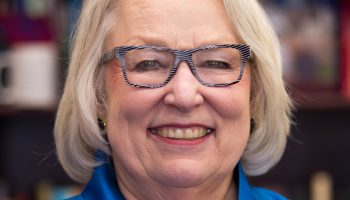In Sony Ton-Aime’s estimation, the most essential tools a poet can have in their toolbox are empathy and a deep sense of curiosity about the world around them. Those are two tools that Jane Hirshfield — a poet, essayist and the Chautauqua Literary and Scientific Circle author for Week One and the theme “What Should be America’s Role in the World?” — has in spades.
“There’s something about her that is very zen,” said Ton-Aime, the Michael I. Rudell Director of the Literary Arts. “I was talking with her, and she said that the first book she remembered picking up when she was 8 was a collection of translations by Japanese poets.”
Hirshfield will discuss her book of poetry, Ledger, at 3:30 p.m. Thursday, June 30, in the Hall of Philosophy.
Hirshfield is the author of nine books of poetry, including Given Sugar, Given Salt which was a finalist for the National Book Critics Circle Award and The Beauty, which was long-listed for the National Book Award.
Ledger (2020) marks the most recent publication in Hirshfield’s extensive career. It delves into ecological and political themes to call attention to how present issues impact the future of the world.
“In Hirshfield’s poetry, there’s a sense of compassion and inquisitiveness,” Ton-Aime said. “But at the same time, she’s able to say things as they are, call things out as they are. That’s something that is very dear to her.”
When Ton-Aime was reading Ledger, one of the first poems in the book struck him as being particularly bold.
“There was one poem, ‘Let Them Not Say,’ that went: ‘Let them not say: we did not see it / We saw,’ ” he said. “It’s the repetition of that line ‘Let them not say,’ that really sticks out to me as being indicative of Hirshfield’s style in Ledger.”
Ton-Aime said he believes that this poem will give readers a sense of calm, while also delivering a warning.
“And at the same time, the poem keeps its subject, all of us, accountable,” he said. “I think that should be the role of the United States in the world, especially as a superpower. America, as a country, should know about the need for compassion in its leadership.”
In 2017 Hirshfield, an environmental spokesperson, partnered with the Wick Poetry Center at Kent State University on a project entitled, “Poets for Science,” which is both a poetry exhibit and a movement that explores the relationship between poetry and science.
“There’s this quote where — I will paraphrase this a bit — Hirshfield said that poetry and science are not opposites, but are in fact complimenting each other,” Ton-Aime said. “ ‘Poets for Science’ came about during the March for Science in Washington, D.C. It was a way for poets to get engaged in the conversation that is happening not only around climate change, but also when it comes to science.”
For Ton-Aime, this boils down to one question, one that he is eager to hear Hirshfield’s discussion on: What is the role of the poet in a world that is becoming more and more skeptical of the truth?




